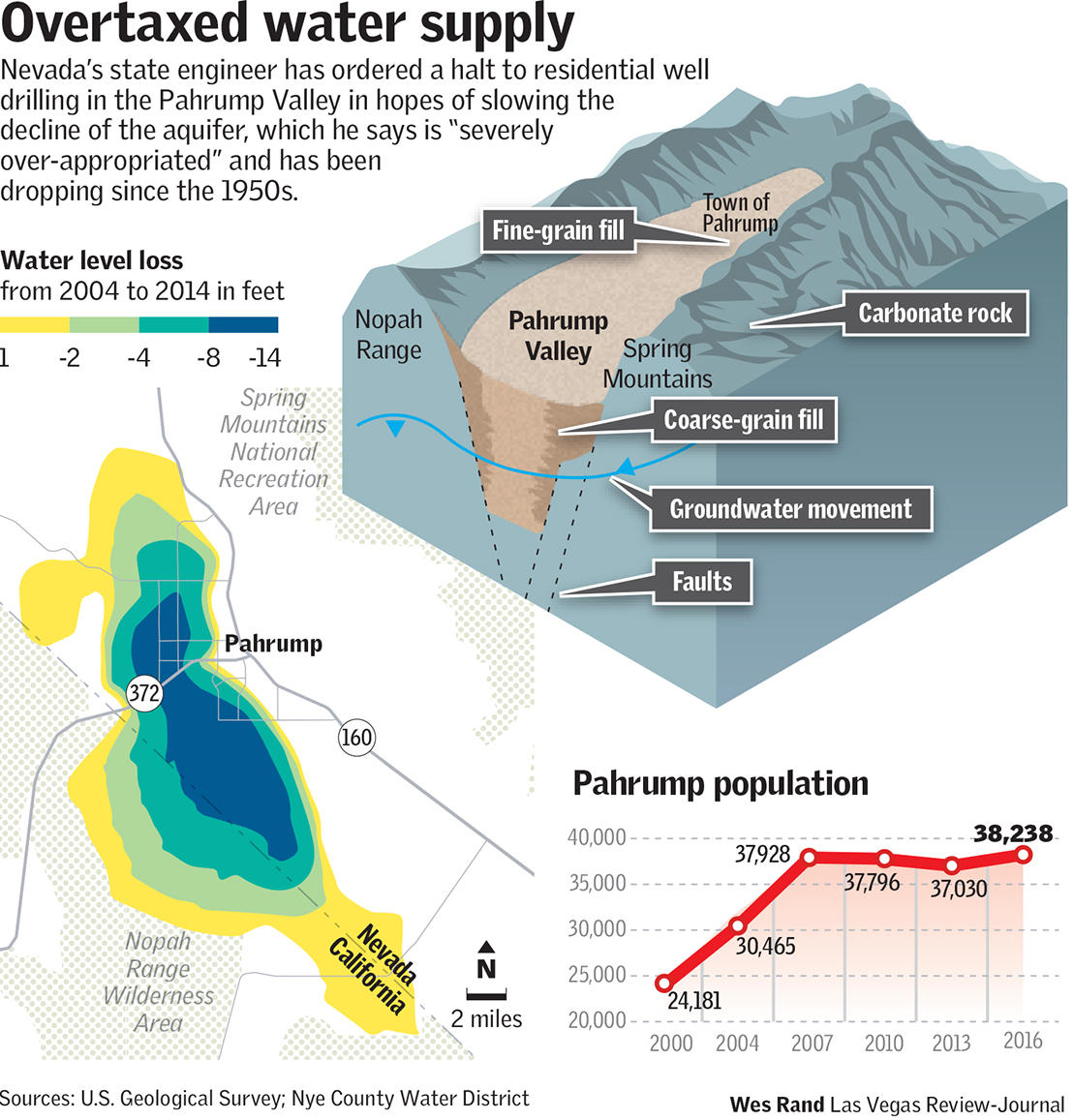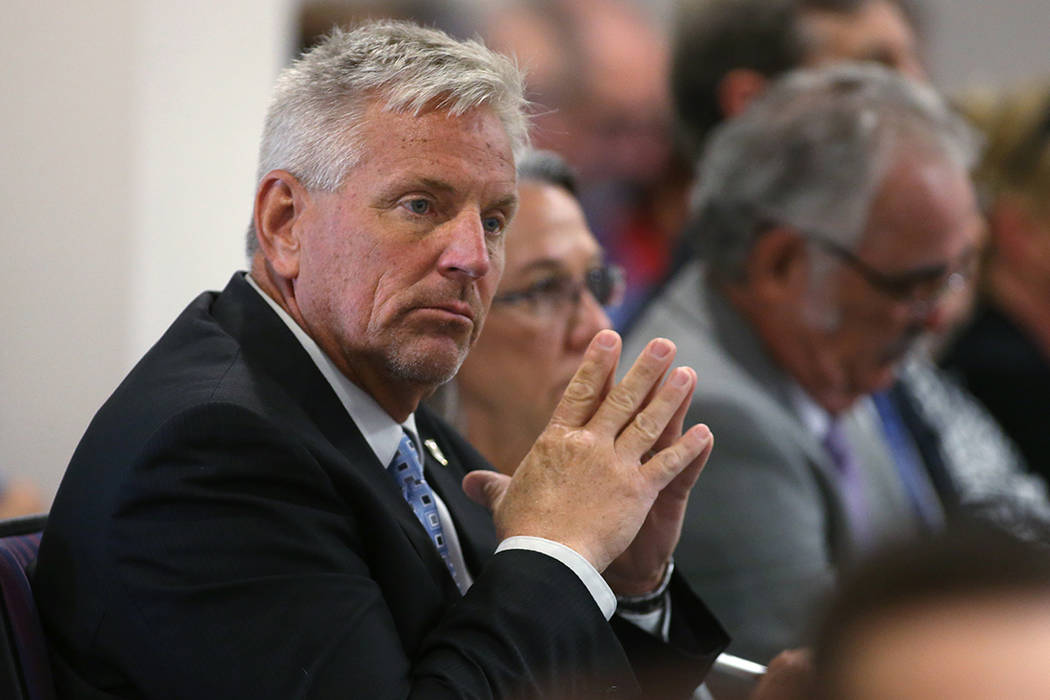Nevada bans new residential wells in Pahrump over groundwater decline
Nevada’s top water regulator has ordered a halt to residential well drilling in Pahrump in hopes of slowing the decline of the community’s overtaxed groundwater supply.
The unprecedented order issued Tuesday by State Engineer Jason King prohibits new domestic wells anywhere in the Pahrump Valley unless property owners first purchase existing water rights.
King said the groundwater basin that supplies Nye County’s largest town is “severely over-appropriated” and cannot support the addition of new wells on top of existing water rights.

Click to see a larger image.
According to state estimates, approximately 20,000 acre-feet of water a year can be pumped sustainably from the ground beneath Pahrump, but more than 59,000 acre-feet of water rights have been issued in the valley.
That total does not include the water that is allowed to be withdrawn from Pahrump’s roughly 11,000 existing domestic wells.
No other basin in Nevada has a higher concentration of such wells, King said. In one square mile, some 489 domestic wells have been drilled into the water table.
‘You have to draw the line’
“You have to draw the line somewhere,” said Oz Wichman, general manager of the Nye County Water District. “You can’t keep stacking on more commitments for additional water.”
The district sent a letter to King on Dec. 11, urging him to enact the moratorium on domestic wells.
Elsewhere in Nevada, state law allows property owners who live outside the service area of a water utility to sink a well and pump up to 2 acre-feet of water a year without a water right.
In Pahrump, a new domestic well can’t be drilled until the property owner signs over to the state 2 acre-feet of existing water rights to offset the new well’s draw on the aquifer.
One acre-foot is enough water to supply two average Las Vegas Valley homes for a little more than a year.
King notes in his order that groundwater levels have declined steadily in Pahrump since the 1950s, despite numerous efforts by the state engineer to regulate pumping and stabilize the aquifer.
He also cites projections from the Nye County Water District showing that continued declines in the water table could cause more than 400 wells to fail by 2035 and more than 3,000 to fail by 2065.
King’s order only applies to new domestic wells, not existing wells that need to be deepened, repaired or replaced.
News spreads ‘like lightning’
Wichman said Thursday that news of the state’s new water directive has spread through Pahrump “like lightning,” and with it has come misinformation, confusion and “a fair bit of anger.”
He said the order is not meant to stunt development in the Pahrump Valley, which he believes can sustain about 80,000 residents, more than double the current population, with the water it has now.
“This is not a no-more-growth order. This is a no-more-water-commitments order,” he said.
The county water district requested the move to help bring Pahrump’s water disparity under control until broader conservation measures and other management strategies can be implemented. Wichman hopes to see that comprehensive water management plan in the hands of his board, the Nye County Commission and the state engineer by next spring.
Already, though, the owner of one local well-drilling business is threating legal action over King’s order.
“There was no reason for this,” said Debra Strickland, president of Strickland Construction and a 43-year resident of Pahrump. “For our own water board to do this to us, it just befuddles me.”
As far as Strickland is concerned, Pahrump doesn’t have a shortage of water so much as a surplus of water rights on the books. She said the state is trying to solve what amounts to an accounting problem by punishing property owners and businesses like hers.
Well driller says she’s out of business
Strickland said 14 of her customers just had their applications to drill domestic wells denied by the state engineer’s office.
“It impacted my business $50,000,” she said. “Today I’m not in the well-drilling business anymore.”
The situation is even worse for property owners, Strickland said. They can expect to pay thousands or even tens of thousands of dollars more to have a new well put in as increased demand drives up the cost of water rights.
Earlier this year, she said, she could buy water rights for about $2,400 an acre-foot. “I imagine they’ll be up to 10,000 (dollars) an acre-foot by next year.”
Strickland already has begun assembling a coalition of local well owners, contractors, drillers and real estate agents to challenge the order in court.
Wichman isn’t surprised.
“Any time that you touch the subject matter of water, it’s controversial,” he said. “When you live in the driest state in the union, that comes with the territory.”
Order prohibiting the drilling of new domestic wells in Pahrump by Las Vegas Review-Journal on Scribd
Contact Henry Brean at hbrean@reviewjournal.com or 702-383-0350. Follow @RefriedBrean on Twitter.
A town in transition
Pahrump has a water problem, but the situation is not as bad as it could be, according to State Engineer Jason King.
For one thing, residents there aren't pumping anywhere close to as much groundwater as they could be.
The town of about 39,000 people is home to roughly 11,000 domestic wells, each of which is allowed to draw up to 2 acre-feet annually. Instead, the average well owner actually uses about half an acre foot a year, King said.
In fact, total water use in Pahrump is significantly lower now than it was back in the 1960s, when it was a small farmingcommunity with no paved roads or telephone service.
At that time, King said, approximately 40,000 acre-feet was being pumped to grow cotton and other crops, causing springsto run dry and the ground to subside in some places.
Today, the community consumes between 13,000 and 16,000 acre-feet of groundwater annually, King said, though thegroundwater levels in the valley continue to decline.
— Henry Brean






















